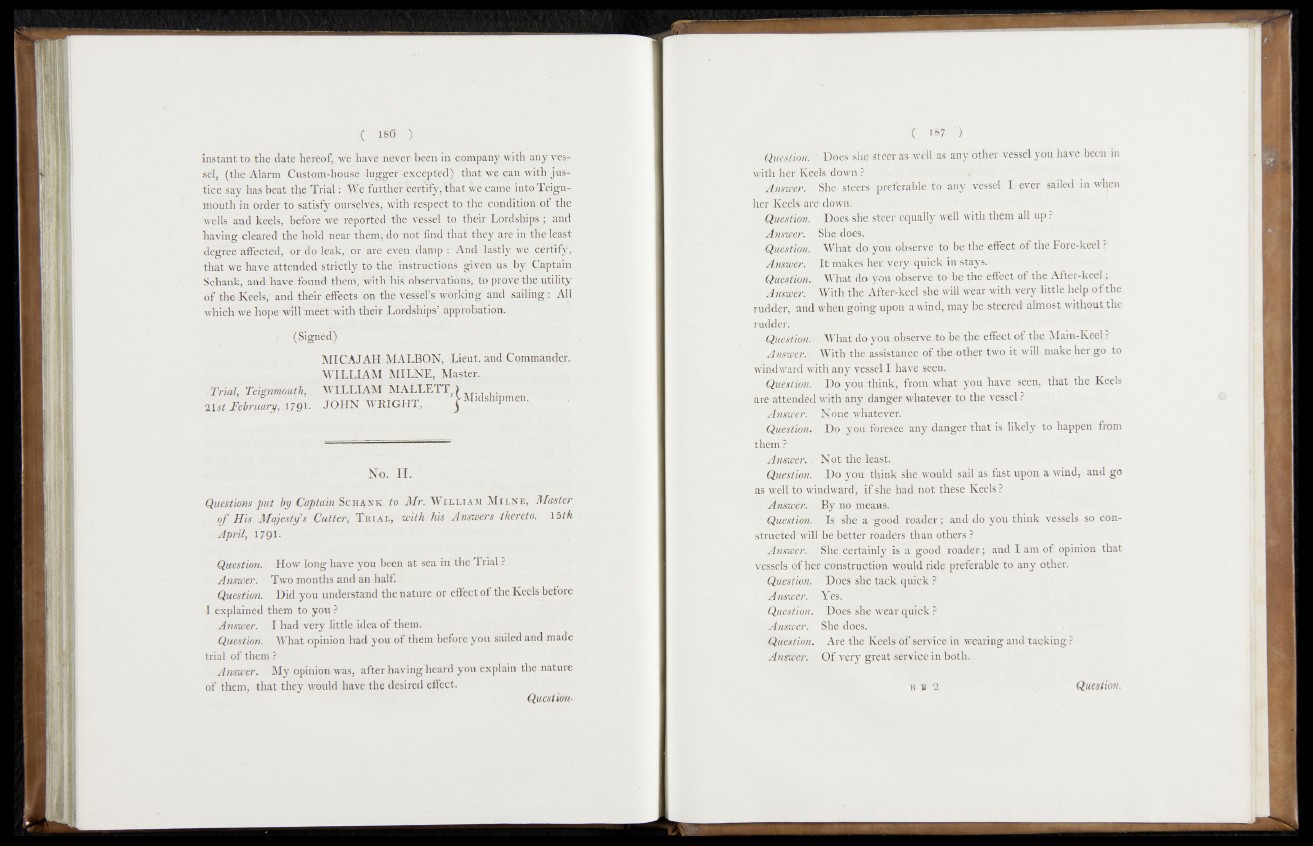
instant to the date hereof, we have never been in company with any vessel,
(the Alarm Custom-house lugger'excepted) that we can with
ticè say has beat th à Trial : We further ‘eeAify/that &e came into Têign-
mouth in order to satisfy ourselves, with respect to, thereonditro^of the
wells and keels, before we reported the vessel to their, Lordships ; and
having cleared the hold riél? themfdonot"find'üîat; they are in't'heriea^t
degme" affected, "or So leak, dr are even‘damp And' lastly we certify,
that we have attended strictly to the instructions given'us .by Captain
Schank, and have ïbttfid tfrem^^with^ his‘observations,’ to prove the utility
of the Keels, and their effects on the vessel’s working and sailing : All
which we hope will ’meet with their Lordships’ approbation.
(Signed)
■Trialj Teignmouth,
l i s t February, 1791 -
MICAJAH MALBQN, Lieut, and Commander.
WILLIAM MILNE, Master.
WILLIAM MALLETT
JOHN WRIGHT, • Midshipmen.
No. n .
Questions put by Captain Schenk to Mr. Wil l iAm MifigE, Master
o f His Majesty's Cutter, T rial, with his Answers thereto. 13th
April, 1791-
Question. How long have you been at sea in thé Trial jp f
Answer. Two months and an half. |j
Question. Did you understand the nature .or effect of the Keels before
I explained them to you 3f «
Answer. I had very little idea of them. -
Question. What opinion had you of them before you sailed and made
trial of them
Answer. My opinion was, after having heard you explain the nature
of them, that they would have the desired effect.
Question•
Question. Does she steer as well as any other vessel you have been in
witheer Keels down pm*
Answer. She steers preferable-to any vessel I ever sailed in when
her Keels are down. .
Question. ' Does she steer equally well with them all up ?
Answers' She d'oes.
Question;'1 What do you observe to be the effect of the Fore-keel ?
Answer. I t makes h e r very quick in stays.
Question. What dp you observe to be tbes effect of the After-keel;
Anséeri With the After-keel she will wear with very little help o f the
rudder, and- when going upon a windy may be steered almost without the
rudder.
Question.sf‘ What do you .observe to be the effect of the Main-Keel?
Answer.' With the? assistance of the other two it will make her go to
windwarif with any vessel I have seen.. ,
Question. Do you think, from what you have seen, that the Keels
are attended with, any-danger whatever to the vessel ? :
An'Sóoèr: r N,önp'whatever.
Question# Bo you foresee any danger that is likely to happen from
then^sSfljg
Answer,. Not th e least.
Question. Do you think she would sail as fast upon a wind, and go
as well to windward, if she had not these Keels ?.t. i -
Answer. By no meaHS.
. Question.'; Is she a good roader; and do you think vessels so constructed
will be better readers than others ?
Answer. She certainly is a good, roader; and I am of opinion that
Vessels of her. construction would ride preferable to any other.
Question. Does she tack quick ?
Answer. Yes. ‘ •
Question. Does she wear quick ?’~r
Answer, She does.
Question. Are the Keels of service in wearing and tacking’?
Answer. Of very great service in both.
B B Question.